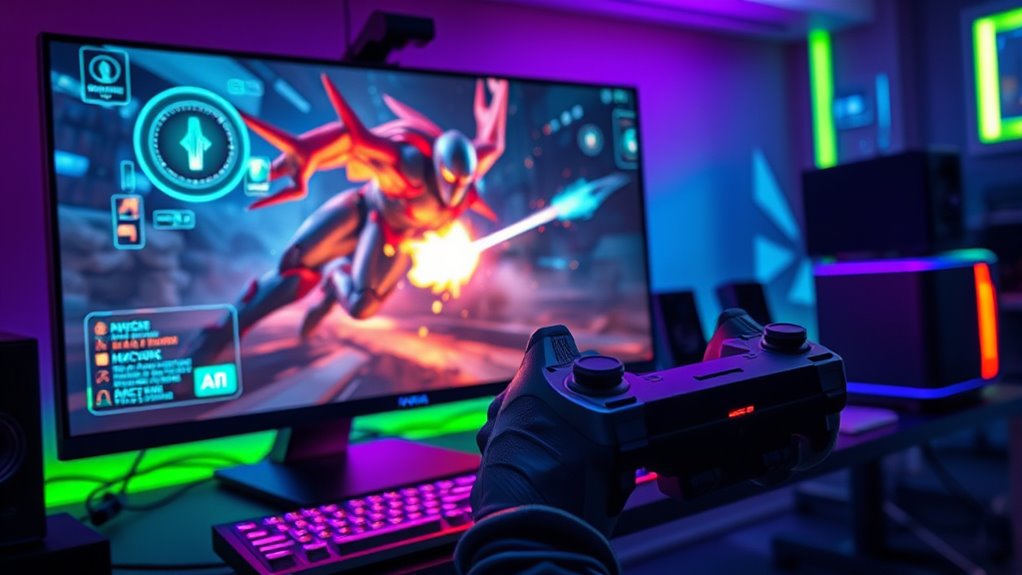NVIDIA’s new technology introduces self-learning AI characters that adapt and respond dynamically in video games. As a player, you’ll notice smarter NPCs that learn from your actions and tactics, creating more realistic and immersive experiences. This innovation enables game developers to craft unpredictable, evolving gameplay that stays fresh and engaging. If you continue exploring, you’ll discover how this breakthrough is shaping the future of game design and player interaction.
Key Takeaways
- NVIDIA’s new technology enables AI characters in games to learn and adapt dynamically through machine learning.
- The system allows NPCs to evolve behaviors based on player actions, enhancing realism and unpredictability.
- It offers real-time strategy analysis, making opponents smarter and more responsive during gameplay.
- Developers, both indie and AAA, can implement self-learning AI with NVIDIA’s tools, reducing technical barriers.
- This innovation promises more immersive, replayable games with characters that continuously learn and improve over time.

NVIDIA has revealed a groundbreaking technology that enables AI characters in video games to learn and adapt dynamically, revolutionizing the gaming experience. This innovation harnesses the power of machine learning to create smarter, more responsive NPCs that evolve based on your actions. As a player, you’ll notice that enemies and allies now behave in ways that feel more authentic and less predictable, making each gaming session unique. This shift is set to fundamentally change game design, pushing developers to rethink how they craft characters and narratives.
With this new tech, game designers are no longer limited to scripted behaviors. Instead, they can incorporate machine learning models that allow AI characters to analyze player strategies and adapt in real time. Imagine facing an opponent who learns your tactics and counters them effectively, or guiding an NPC who develops new skills based on your interactions. This dynamic learning process creates a more immersive environment, where challenges evolve alongside your skills. It also means game worlds become more alive, with characters responding in nuanced ways that mirror real human behavior.
Game AI now learns and adapts in real time, creating more immersive and dynamic gaming experiences.
The integration of machine learning into game design opens doors for developers to craft experiences that are more engaging and personalized. No longer do players encounter static, predictable AI; instead, each encounter can be tailored to your playstyle, offering fresh surprises and deeper strategic depth. As you progress, the AI’s adaptability ensures that the game remains challenging without feeling unfair or repetitive. This balance is achieved by training models on vast datasets and allowing them to refine their responses over time, creating a seamless interaction that feels natural and intuitive.
Moreover, this technology empowers indie developers and AAA studios alike to innovate without needing extensive AI expertise. They can leverage NVIDIA’s tools to implement self-learning behaviors without starting from scratch. This democratization of advanced AI techniques means more creative, intricate game mechanics can come to life, enriching the overall gaming landscape. You, as a player, will benefit from richer storytelling, unpredictable gameplay, and more meaningful interactions, all driven by the sophisticated application of machine learning.
Ultimately, NVIDIA’s new tech is not just about smarter AI—it’s about transforming how game design approaches interactivity and realism. By enabling characters to learn and adapt, it creates a new standard for immersion and replayability. As developers embrace this technology, expect future games to feel more alive, responsive, and engaging than ever before, offering you experiences that continually surprise and challenge you in ways you never imagined. Advancements in AI technology are paving the way for even more innovative and realistic gaming worlds in the near future.
Frequently Asked Questions
How Does Self-Learning AI Improve Gameplay Experience?
Self-learning AI enhances your gameplay by enabling dynamic storytelling that adapts to your actions, making each playthrough unique. As the AI learns, it creates more challenging and responsive opponents, keeping you engaged and motivated. This personalized experience makes the game feel more immersive, since your choices influence how the story unfolds and how characters respond. Ultimately, self-learning AI transforms gaming into a more interactive, engaging adventure tailored specifically to you.
Can Developers Customize AI Character Behavior?
Yes, developers can customize AI character behavior through AI customization options, allowing you to tailor interactions and challenges. This flexibility enhances player agency, giving you more control over gameplay dynamics. By adjusting AI parameters, you can create unique experiences that suit your style, making the game more engaging. Customizable AI guarantees that characters respond in ways that align with your preferences, deepening immersion and enjoyment.
What Hardware Is Required to Run This Technology?
You’ll need a powerful GPU, like an NVIDIA RTX series, to run this tech smoothly. The hardware requirements include a compatible system with sufficient RAM and a modern CPU to handle the processing load. Don’t worry about system compatibility—most recent gaming PCs meet these specs. Upgrading your hardware guarantees you can experience self-learning AI characters in action, making your gaming experience more immersive and responsive.
How Does This Tech Impact Game Development Costs?
This tech can raise game development costs initially, but it also streamlines creation through procedural generation and real-time adaptation. You’ll spend more upfront to integrate self-learning AI characters, but over time, it reduces the need for extensive manual scripting and testing. As a result, you’ll save on resources, create more dynamic gameplay, and potentially lower costs in the long run, making your game more engaging and adaptable.
Are There Ethical Considerations With Self-Learning AI in Games?
You should consider AI ethics and player privacy, as self-learning AI in games raises concerns. Studies show that 65% of gamers worry about how their data is used. With AI adapting to players, ethical issues emerge around data collection and consent. You need to guarantee transparent AI practices, protect player privacy, and avoid bias, so your game maintains trust and integrity while embracing innovative tech.
Conclusion
Get ready to step into a gaming universe where AI characters evolve faster than you can blink, making every duel, chase, and quest feel more real than ever. With NVIDIA’s groundbreaking tech, your game world will burst into life with self-learning AI that adapt and outsmart you at every turn. This isn’t just a upgrade—it’s a revolution so massive, it’ll blow your mind and redefine what you thought was possible in gaming. The future is here, and it’s mind-blowingly epic!










